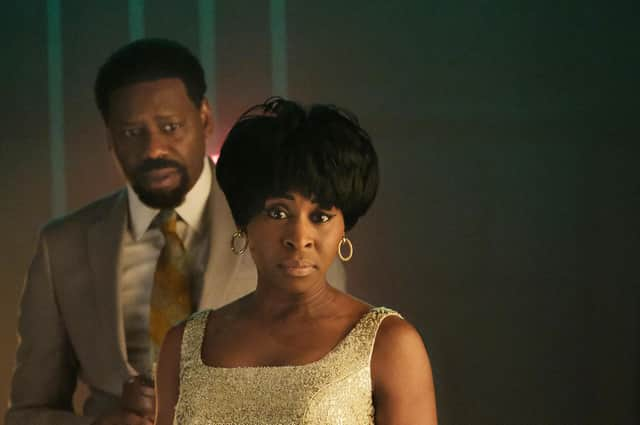‘It was a big deal to leave the gospel world and to do pop music’ - Courtney B Vance


Releasing her debut single in 1967 following her signing to Atlantic Records, Franklin proceeded to unveil 73 singles that charted on the Billboard Hot 100 – the US equivalent of the UK Singles Chart.
Surprisingly, though, only two tracks ever reached number one.
Advertisement
Hide AdThe first came in the form of Franklin’s renowned 1967 Otis Reading cover Respect. The second, a 1987 duet with George Michael entitled I Knew You Were Waiting (For Me).


And yet, there was a contrasting side to the I Say A Little Prayer singer.
Drawing musical inspiration from her painful family life, as well as endorsing activism alongside her father, Baptist minister CL Franklin, the singer helped fuel a number of seminal moments in American history.
It’s a lesser-known side explored as part of new National Geographic series, Genius: Aretha.
Written by The United States vs. Billie Holiday screenwriter Suzan-Lori Parks, Genius: Aretha stars The Outsider and Mr Selfridge actress Cynthia Erivo as Aretha Franklin, alongside Courtney B Vance as Aretha’s father.
“There are wounds in the lives of these characters that needed to be aired,” says Parks, 58.
Advertisement
Hide Ad“They’re not only just the wounds of [the Franklin] family, they’re wounds of the black American family, they’re wounds of America, they’re wounds of the world.
“This is why she was the Queen of Soul.
“She wasn’t just the Queen of American soul. She wasn’t just the Queen of black soul.
Advertisement
Hide Ad“She knew how to access the difficulties in her life and she knew that the difficulties in her life were – in part – experienced by a lot of other people, and by talking about those difficulties, we offer everybody an opportunity for healing.”
Not to be confused with the forthcoming Aretha Franklin biopic Respect, new eight-part series Genius: Aretha sheds light on the private life of the soul icon like never before.
Directed by Emmy Award-winning Anthony Hemingway (Power/American Crime Story), the third installment of National Geographic’s eye-opening anthology series was created with the blessing of the Franklin family.
“I had no idea how she had to struggle,” admits Vance, 61, of the singer’s story.
“I mean, they lived in a little McMansion and so the family had an oversized life for a black family in the Fifties and Sixties.
“But I would not have guessed that she had to struggle so much as a little girl, with her mother leaving the house [when she was] 10 years old – the trauma of it.
Advertisement
Hide Ad“When you get to the place where your mother says, ‘I’m out’, that means you’ve seen the steps that are taken for her to go, ‘I’m out’.
“And that mommy leaves and not daddy; it’s just mind-blowing to discover those kinds of things about her childhood and how traumatised she was.”
Advertisement
Hide AdStepping into the shoes of CL Franklin, a character Vance describes as “larger than life”, the actor was initially struck by the power the outspoken Baptist minister and civil rights activist held.
A pivotal figure in the lives of both his daughter, Aretha and the wider community, Franklin held a considerable public platform throughout the 1950s, Sixties and Seventies.
“CL Franklin was like a president in the black community,” says Vance.
“When he said ‘we’re going to do a March in Detroit’, it drew about 100,000 people. Martin Luther King came and did the preview of his ‘I Have a Dream’ speech. He did a practice run of it.
“And so in that house, there were all sorts of celebrity, secular and religious leaders that came through, and it was a big party.”
A man who believed in playing secular music alongside gospel music – a practice that was not widely accepted at the time – CL Franklin helped his daughter to leave her mark on history.
Advertisement
Hide Ad“We know that so many of the pop singers in the black community came out of the church,” says Vance, “and it was a big deal for them to come out and leave the gospel world and to do pop music.
“It was almost sacrilegious, but so many did and became huge, huge mega stars – James Brown, I mean, everybody grew up in the church, because that was the only place where you could sing.
Advertisement
Hide Ad“There was no outlet for black people and so all of a sudden this transition happened and Aretha wanted to be part of it.
“She wouldn’t have become who she was if it wasn’t, for better or for worse, for her daddy – and she knew that.”
A renowned star of stage and screen, London-born Erivo, 34, is charged with bringing Aretha Franklin – and her extensive back catalogue – to life.
Recalling her first meeting with Parks ahead of the project at New York’s NoMad Hotel, Erivo reflects upon the strange set of coincidences that preceded her casting.
“As I walked in, music was playing – just like normal, easy hotel music that didn’t really have any lyrics.
“And as I sat down ‘Daydreaming’ by Aretha started playing, which is very strange. And once that song was gone, it went back to the normal hotel music.
Advertisement
Hide Ad“I was like, ‘did you plan this?’ and Suzan said, ‘No, I didn’t! And I don’t know why this happened’.
“It felt like another sign.”
Beyond the superficialities of pop stardom, Erivo hopes the series will shed light on the human behind the icon and help people to understand the singer’s struggles.
Advertisement
Hide Ad“I’m always drawn in by the idea we can give humanity to the people we see as icons,” says Erivo. “Because now we get to understand that what we see as public facing – the music that we hear, the interviews we get to watch – all come from the human condition.
“They come from the humanity of a person, which often gets overlooked when they are of a certain status.
“And we forget that there’s a person behind all of this.”
Comments
Want to join the conversation? Please or to comment on this article.